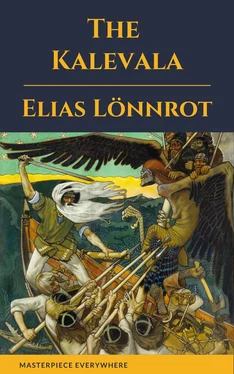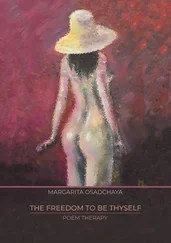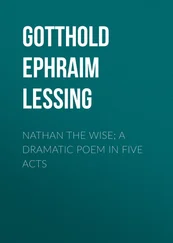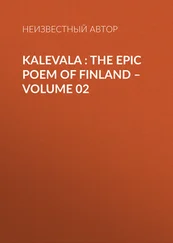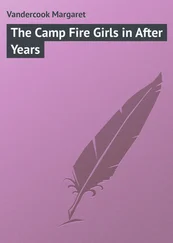In a gold and silver air-gown,
Weaving webs of golden texture,
Interlacing threads of silver;
Weaving with a golden shuttle,
With a weaving-comb of silver;
Merrily flies the golden shuttle,
From the maiden's nimble fingers,
Briskly swings the lathe in weaving,
Swiftly flies the comb of silver,
From the sky-born maiden's fingers,
Weaving webs of wondrous beauty.
Came the ancient Wainamoinen,
Driving down the highway homeward,
From the ever sunless Northland,
From the dismal Sariola;
Few the furlongs he had driven,
Driven but a little distance,
When he heard the sky-loom buzzing,
As the maiden plied the shuttle.
Quick the thoughtless Wainamoinen
Lifts his eyes aloft in wonder,
Looks upon the vault of heaven,
There beholds the bow of beauty,
On the bow the maiden sitting,
Beauteous Maiden of the Rainbow,
Glory of the earth and ocean,
Weaving there a golden fabric,
Working with the rustling silver.
Wainamoinen, ancient minstrel,
Quickly checks his fleet-foot racer,
Looks upon the charming maiden,
Then addresses her as follows:
"Come, fair maiden, to my snow-sledge,
By my side I wish thee seated."
Thus the Maid of Beauty answers:
"Tell me what thou wishest of me,
Should I join thee in the snow-sledge."
Speaks the ancient Wainamoinen,
Answers thus the Maid of Beauty:
"This the reason for thy coming:
Thou shalt bake me honey-biscuit,
Shalt prepare me barley-water,
Thou shalt fill my foaming beer-cups,
Thou shalt sing beside my table,
Shalt rejoice within my portals,
Walk a queen within my dwelling,
In the Wainola halls and chambers,
In the courts of Kalevala."
Thus the Maid of Beauty answered
From her throne amid the heavens:
"Yesterday at hour of twilight,
Went I to the flowery meadows,
There to rock upon the common,
Where the Sun retires to slumber;
There I heard a song-bird singing,
Heard the thrush simple measures,
Singing sweetly thoughts of maidens,
And the minds of anxious mothers.
"Then I asked the pretty songster,
Asked the thrush this simple question:
'Sing to me, thou pretty song-bird,
Sing that I may understand thee,
Sing to me in truthful accents,
How to live in greatest pleasure,
And in happiness the sweetest,
As a maiden with her father,
Or as wife beside her husband.'
"Thus the song-bird gave me answer,
Sang the thrush this information:
'Bright and warm are days of summer,
Warmer still is maiden-freedom;
Cold is iron in the winter,
Thus the lives of married women;
Maidens living with their mothers
Are like ripe and ruddy berries;
Married women, far too many,
Are like dogs enchained in kennel,
Rarely do they ask for favors,
Not to wives are favors given.'"
Wainamoinen, old and truthful,
Answers thus the Maid of Beauty:
"Foolish is the thrush thus singing,
Nonsense is the song-bird's twitter;
Like to babes are maidens treated,
Wives are queens and highly honored.
Come, sweet maiden, to my snow-sledge,
I am not despised as hero,
Not the meanest of magicians;
Come with me and I will make thee
Wife and queen in Kalevala."
Thus the Maid of Beauty answered—
"Would consider thee a hero,
Mighty hero, I would call thee,
When a golden hair thou splittest,
Using knives that have no edges;
When thou snarest me a bird's egg
With a snare that I can see not."
Wainamoinen, skilled and ancient,
Split a golden hair exactly,
Using knives that had no edges;
And he snared an egg as nicely
With a snare the maiden saw not.
"Come, sweet maiden, to my snow-sledge,
I have done what thou desirest."
Thus the maiden wisely answered:
"Never enter I thy snow-sledge,
Till thou peelest me the sandstone,
Till thou cuttest me a whip-stick
From the ice, and make no splinters,
Losing not the smallest fragment."
Wainamoinen, true magician,
Nothing daunted, not discouraged,
Deftly peeled the rounded sandstone,
Deftly cut from ice a whip-stick,
Cutting not the finest splinter,
Losing not the smallest fragment.
Then again be called the maiden,
To a seat within his snow-sledge.
But the Maid or Beauty answered,
Answered thus the great magician:
I will go with that one only
That will make me ship or shallop,
From the splinters of my spindle,
From the fragments of my distaff,
In the waters launch the vessel,
Set the little ship a-floating,
Using not the knee to push it,
Using not the arm to move it,
Using not the hand to touch it,
Using not the foot to turn it,
Using nothing to propel it."
Spake the skilful Wainamoinen,
These the words the hero uttered:
"There is no one in the Northland,
No one under vault of heaven,
Who like me can build a vessel,
From the fragments of the distaff,
From the splinters of the spindle."
Then he took the distaff-fragments,
Took the splinters of the spindle,
Hastened off the boat to fashion,
Hastened to an iron mountain,
There to join the many fragments.
Full of zeal be plies the hammer,
Swings the hammer and the hatchet;
Nothing daunted, builds the vessel,
Works one day and then a second,
Works with steady hand the third day;
On the evening of the third day,
Evil Hisi grasps the hatchet,
Lempo takes the crooked handle,
Turns aside the axe in falling,
Strikes the rocks and breaks to pieces;
From the rocks rebound the fragments,
Pierce the flesh of the magician,
Cut the knee of Wainamoinen.
Lempo guides the sharpened hatchet,
And the veins fell Hisi severs.
Quickly gushes forth a blood-stream,
And the stream is crimson-colored.
Wainamoinen, old and truthful,
The renowned and wise enchanter,
Thus outspeaks in measured accents:
"O thou keen and cruel hatchet,
O thou axe of sharpened metal,
Thou shouldst cut the trees to fragments,
Cut the pine-tree and the willow,
Cut the alder and the birch-tree,
Cut the juniper and aspen,
Shouldst not cut my knee to pieces,
Shouldst not tear my veins asunder."
Then the ancient Wainamoinen
Thus begins his incantations,
Thus begins his magic singing,
Of the origin of evil;
Every word in perfect order,
Makes no effort to remember,
Sings the origin of iron,
That a bolt he well may fashion,
Thus prepare a look for surety,
For the wounds the axe has given,
That the hatchet has torn open.
But the stream flows like a brooklet,
Rushing like a maddened torrent,
Stains the herbs upon the meadows,
Scarcely is a bit of verdure
That the blood-stream does not cover
As it flows and rushes onward
From the knee of the magician,
From the veins of Wainamoinen.
Now the wise and ancient minstrel
Gathers lichens from the sandstone,
Picks them from the trunks of birches,
Gathers moss within the marshes,
Pulls the grasses from the meadows,
Thus to stop the crimson streamlet,
Thus to close the wounds laid open;
But his work is unsuccessful,
And the crimson stream flows onward.
Wainamoinen, ancient minstrel,
Feeling pain and fearing languor,
Falls to weeping, heavy-hearted;
Quickly now his steed he hitches,
Hitches to the sledge of birch-wood,
Climbs with pain upon the cross-bench,
Читать дальше
